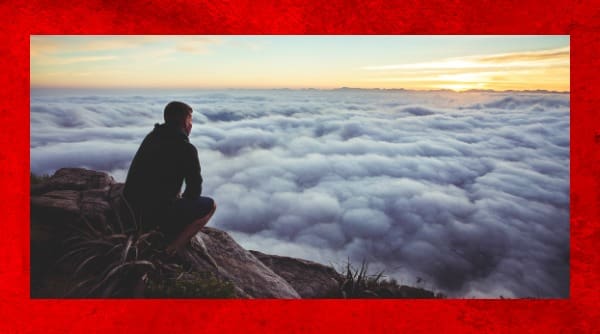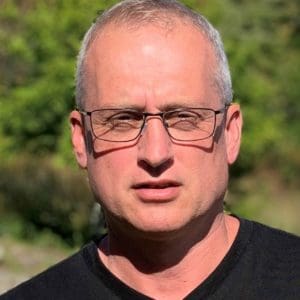And men go abroad to admire the heights of mountains, the mighty waves of the sea, the broad tides of rivers, the compass of the ocean, and the circuits of the stars, yet pass over the mystery of themselves without a thought. – St. Augustine, Confessions
Why is it that the preeminent battle, the battle of paramount consequence, the battle not fought by representative soldiers on distant shores but by every one of us, closer than close, within and without, is the battle most of us do not even know we are waging? And how is it that this battle whose victory or defeat will result in either the blackest, most sorrowful, and hate-filled agony or in the purest, most blissful, bursting ecstasy—all of it never-ending—is, for most, a presumption of the latter or simply an afterthought?
We are body, we are spirit. We cannot see our spirit, yet it is with us, it is us. And because this is true it can only be true that there is a spirit world, existing on a plane not fully available to us in our purely earthly consciousness. And so it can be said there is a veil, something preventing us from fully seeing that which exists outside our eyes’ pure function. That veil derives from our fallenness. Adam and Eve in the garden were not similarly veiled. Their sin changed the nature of their existence, our existence, and our experience of what it means to be created and to live. And now we till the soil to subsist. And now we know our nakedness, so conscious are we of the body, our physicality. Living so intensely in the body, working so hard to sustain it, has become our focus. And to the extent that we do this to the neglect of our spirit, so our ultimate fortunes lie. This is the battle of earthly life.
And so we are veiled, but how can we be so sure this veil exists? Leaving aside God’s revelation through His Church, we all experience life beyond the veil, to one conscious degree or another, in those times when something so beyond mere coincidence occurs in our lives; God’s moving hand. Or when we feel a presence, though we are alone; the nearness of spirits. Or when, in a quiet moment, we simply know there has to be something more; our soul’s deep yearning. And then there are those times of great awakening, when we are moved by the incomprehensible beauty of a created thing, or in gratitude’s flush in an act of giving, or in our internal sickening when we know we have transgressed. There is just something more to us, to this. These are not the lived experiences of mere animals, and only we can convince ourselves—or allow ourselves to be convinced—that we are some evolutionary randomness.
And there are also times, more overt, when for some God makes His presence truly known through His gift of peace of soul or even through the great rattling of direct experience of Him through visions or ecstasies or other such graces. There are even times when He allows us to experience that other presence beyond the veil, evil. I know about these things because I have experienced them. I have lived with the veil pulled back, both through His grace of His coming to me, ethereally, and in His further grace of allowing evil’s attack and a great suffering of soul. These gifts—not asked for, and so difficult to endure—have allowed me to experience not only life beyond the veil, but both potential outcomes of our earthly lives. Every one of us will be one or the other, eternally, and the starkness of these oppositions could not be more harsh. We are body, we are spirit. We are created, we are accountable. This is the battle of earthly life.
As St. Augustine recognized, we often fail to consider the deep mystery of ourselves, and thus we fail to understand this elemental battle. The consequences could not be more grave. In our circumspection, then, what does it mean to be human? To be human is to exist in body, in soul, and to have a purpose. Our purpose is to know Him, to serve Him and to love Him. Through our very nature and through God’s grace we are capable of this. Satan’s victory in the Garden, though, has rendered us confounded, and at least in part, necessarily worldly. If we fail to understand this, we fail to understand ourselves. But if we do understand it, or engage the journey to understand it, we see, or begin to see true beauty. We are beauty, because He is beauty, and His revelation is in us, if we allow it to be. But we are busy. And we are weak. And we are limited. And we are veiled. And we are influenced by our surroundings, by our culture, by our upbringing and, importantly, by the spirit world beyond the veil. To not wonder at ourselves, to not engage the journey of Truth, is to not recognize this. To not recognize this is evil’s further victory on a battlefield where there is so much—everything—to be gained or lost. This is the battle of earthly life.
And so we are fallen, and we fall, but He is merciful, and He is love. The ultimate expression of this love is Jesus Christ, Himself, who has redeemed us through His death and resurrection, and thus opened the gates of Heaven, reconciling humanity with God, and atoning, for us, that one great fall. But that greatest sacrifice is not the end of the story, our story. We are alive. We live. And our story is ongoing, right up to the moment of our death and our particular judgment, when we will fully know what it has meant to be human. When all has been peeled away, when the veil has lifted, when we see ourselves as God sees us. When we realize the result of the battle of earthly life.
I have experienced this in some measure. His allowing me to see my sins. To experience the pure sorrow of my impurity. To feel the separation of my soul from Him through my own actions. To recognize my own guilt in His cross, that I, too, crucified Him. The drenching, heartbreaking pain of regret alongside the insidious attack and gnaw of evil. I wish this experience on no one except should it save them, and that no soul would endure this in perpetuity. And over the weeks it lasted, while the veil separating my physical life from the life of my soul was lifted, I was able to see, literally visually, the darkness of the world. The gray heaviness of evil that hangs here, permeated. I sensed this gray heaviness is not just Satan’s malevolent presence, but the growing collective evil of our cultural assent, of individual surrenderings of souls to worldliness, to indiffeerence, to relativism, to skepticism, to lukewarmness and, even, to the outright embrace of evil. We are all affected, and we all, to one degree or another, contribute. The more we give over—individually, collectively—the more powerful evil becomes both within us, and within our world, and the less we even recognize it. Combatting this darkness is a spiritual battle, spiritual warfare, and it is a battle most of us do not even know we are waging. This is the battle of earthly life.
As heavy as this is, we must remember God created the world and it is good. His glory is everywhere. From the glow of a child’s smile to the glittering playfulness of dust in the light to the satisfying bounce of a basketball’s leather on a polished wood floor. Yes, God created the world, and it is good. We exist in it, in dominion of it, though because of the Fall, not as lords of it. But it is ours, and we experience the rightful joy of dominion in the satisfaction of hard work and achievement, of using God’s gifts, of being fruitful in worldly ways and multiplying. Of living. Of engaging the world, the worldly. Of breathing in and, with satisfaction, exhaling our compiling small moments, our milestones, recognizing Him, as we should, in all things, making the most of ourselves as a gift to Him, and helping others as further testimony. God created the world and it is good, but it is so intensely before us, and we are so intensely in it, and we are weak, and we are limited, and we are veiled and there is constant danger in the misuse of it, in the misdirection of our work, in our making God’s good fruits ends in themselves. It is a constant battle that our achievements do not become sources of pride, that we do not abuse God’s creation for our simple gain, that we do not “get ahead” at the expense of others. That we see to others’ needs and not just our own. That we are not indifferent. That we do not waste time. That we seek Him in all things. That He is our motivation. That we know Him, serve Him, and love Him right up to our very last breath. There is literally nothing else. It is a constant, daily battle, and it is, too, a battle many of us do not even know we are waging. This is the battle of earthly life.
Our individual battles are being won or lost based on our choices. Our choices are rooted in our free will. Though our will is free—even in the most constricted circumstance—our choices are not all the same. And this is why there is only one ultimate judge. There is so much we do not see and cannot understand. We are all somewhere on the continuum of life to death, our path to Him or away from Him. We begin in different spots. We proceed with different gifts, different challenges, different graces, different sufferings. Our one similarity is that we are made to know Him. And He is love. We are made to know love. We are capable of that with His grace and our effort. We are to live it, model it and constantly strive for it. We are to profess it so that others can come to know it, too. But it is hard, and so much works against us. We, ourselves. The world’s allure. Evil beyond the veil. To not know this is to not understand what it means to be human. To not understand what it means to be human is to be unprepared in this greatest battle, this battle of earthly life.
And so it comes down to the prize in this battle, this most intensely good and precious prize. You. You are that prize. Your soul is that prize. You may think you are the only one who is concerned with it. You are not. God wants what is rightly His. Satan wants to destroy that which God desires. Make no mistake, and have no misconception. Satan’s victory is your destruction, and he is at work on it. To not understand this, is to not understand the battle—your battle. It is just as St. Paul warned, For we are not contending against flesh and blood, but against the spiritual hosts of wickedness in the heavenly places (Ephesians 6:12). And Matthew (6:28), And do not be afraid of those who kill the body but cannot kill the soul; rather, be afraid of the one who can destroy both soul and body in Gehenna. To recognize this, to know it is to know what it means to be human, to embrace of the wonder of being both body and soul, to recognize our fallenness, but also our worthiness. To recognize this and embrace it is to choose victory by putting on the armor of light. It is our choice. And this—this—is the battle of earthly life.
Image courtesy of Unsplash.




